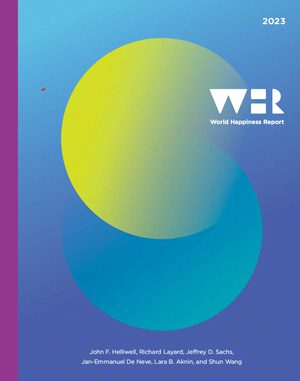
Mar 29, 2023 World Happiness Report 2023
 The first World Happiness Report (WHR) appeared in 2012. In 2013, the UN General Assembly declared March 20th the International Day of Happiness (Resolution 66/281). In 2013 and every subsequent year except 2014, the World Happiness Report, written by an expanding group of experts, was released on March 20th. The 2023 report is the eleventh in the series.
The first World Happiness Report (WHR) appeared in 2012. In 2013, the UN General Assembly declared March 20th the International Day of Happiness (Resolution 66/281). In 2013 and every subsequent year except 2014, the World Happiness Report, written by an expanding group of experts, was released on March 20th. The 2023 report is the eleventh in the series.
The WHR typically includes many factoids and detailed analyses and is impossible to summarize adequately in a short newsletter article. However, the report is freely available to download from the World Happiness Report webpage, maintained by the Sustainable Development Solutions Network. WellBeing International has reported on WHR 2020, 2021, and 2022 in previous newsletters.
Gallup World Poll data has been a foundational resource for all World Happiness Reports. Gallup has conducted an annual poll of life satisfaction since 2006 across more than 160 countries. As in previous years, the rankings for life satisfaction are led by the Scandinavian countries. In the 2023 WHR, the life satisfaction values for 2021, 2022, and 2023 were averaged. Scandinavian countries occupied five of the top seven positions, with Israel (number 4) and the Netherlands (number 5) taking the other two positions. [Note: Life satisfaction and emotional well-being are two important but different components of subjective well-being. Emotional well-being refers to the frequency and intensity of daily positive and negative experiences, whereas life satisfaction generally refers to a longer-term assessment of one’s life. The two are connected but different.]
The report comments on the vital role of state effectiveness in the happiness of its citizens. For example, the citizens in Scandinavian countries have high trust in their governments and bureaucratic institutions. Such trust is an important factor in the high life satisfaction scores obtained in the Scandinavian countries. In contrast, the countries where national governments are weak and corrupt tend to cluster at the low end of the life satisfaction scores.
A Few Highlights from WHR 2023
In general, national well-being has been remarkably resilient despite the increase in global morbidity and mortality caused by the pandemic and the Russian invasion of Ukraine. Helping and altruistic behaviors increased during the pandemic and may have acted to counter the adverse effects of the pandemic and associated lockdowns.
The beneficiaries of helping behaviors are expected to feel better. However, the report notes that altruists also feel better after engaging in helping behaviors. Empirical research finds that when people are given money to give to others, they feel happier than those given money to keep for themselves. In addition, the reverse occurs – an increase in well-being leads to an increase in helping behaviors.
Covid has not been the only global crisis. The report notes that the Russian invasion of Ukraine led to a record increase in benevolence in Ukraine in 2022. Confidence in their leadership also increased in 2022 despite the widespread destruction of Ukrainian infrastructure.
The report also commented on the global levels of misery (life satisfaction scores of 4 and below and three and below). Both of these measures of misery fell during the three Covid-19 years.
The 2023 WHR also discusses progress in using social media (e.g., Twitter) data to track life satisfaction and happiness for specific countries and regions within countries. The technical sophistication of social media analyses has improved significantly over time. According to WHR 2023, the current generation of social media happiness tracking technologies supports “unparalleled measurement in space and time” of happiness and life satisfaction assessments.
The analysis of global happiness trends produced several positive results. In all seven languages studied, mentions of “happiness” have more than doubled since 2012. The fraction of published research articles referring to happiness terms is steadily rising, while references to GDP have declined. Happiness research also influences public policy in several countries, including well-being policy leaders in New Zealand, Scotland, Canada, and the UK. Over twenty countries are now members of the Wellbeing Economy Alliance (WEALL).
The 2023 edition of the World Happiness Report is again crammed full of interesting data and observations. For example, one question that has been used to quantify the level of trust in a country asks people whether they would expect a lost wallet to be returned to them. Countries, where more respondents agree that their wallets would be returned, have higher levels of public trust. However, according to comments by John Helliwell in the WHR 2023 launch webinar, experiments indicate that people underestimate trust levels in their countries. The number of lost wallets returned is double the rate survey respondents predicted!
This latest World Happiness Report identifies additional areas where more research would be helpful. For example, how might countries or institutions promote virtuous character and behavior, and what is the relationship between people’s values and happiness? Two books reviewed by WellBeing International provide some guidance. The Happiness Hypothesis by social psychologist Jonathan Haidt is perhaps the best analysis of the positive psychology movement and associated research examining how we might promote happiness in ourselves and others. In addition, The War for Kindness by Stanford Neuroscientist Jamil Zaki examines empathy and describes how empathy for others might be increased. Zaki notes, “Empathy is not just a precious resource; it is a renewable one.”


